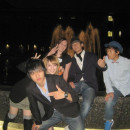Life in Osaka Past Review
By Chelsea S (International/Global Studies., University of Hartford) for
Kansai Gaidai University: Hirakata - Direct Enrollment & Exchange
Yes.
Review Photos



Personal Information
| How much international exposure did you have prior to this program? | 1 month - 6 months |
Review Your Program
|
* Overall educational experience
Academic rigor, intensity, resources, etc. |
Kansai Gaidai uses an American-styled grading system. Teaching methods of course vary by professor but overall most adopted Socratic teaching methods and encouraged class participation. Spoken Japanese is mandatory, meets 5 days for a week for 50 minutes a day and there is homework every night. Asian studies classes meet twice a week for an hour and a half, and course content natural varies by course. There are courses in the fields of business, economics, politics, psychology, sociology, art, history, social activism, and many others with focus on highlighting Japan as diverse and dynamic and its role in the world. Classmates are primarily other exchange students from all around the world, with the exception of "gaidaisei" or the Japanese students enrolled in Kansai Gaidai who are required to take a few classes in English alongside the foreign students if they are planning to study abroad in the near future. Overall I did not feel there were any major differences between Kansai Gaidai and the American educational system, especially since Kansai Gaidai uses the American semester calendar, with the fall semester running from September to December and spring from February to the end of May. This is in contrast to the Japanese academic calendar, in which the first semester starts in April and ends in July, followed by the second semester which starts in mid-September and ends in January. |
|
* Host Country Program Administration
On-site administration of your program |
Kansai Gaidai is overall great. They have many staff and programs to support foreign students, and the campus is overall well-receiving for foreign students. Class sizes are relatively small 10-30 depending on a course's popularity, and it is easy to build relationships with faculty. There are special dorms or seminar houses for foreign students, and also a homestay program. I opted to live alone in my own apartment unsponsered by Kansai Gaidai, but they can also recommend a few near-campus accommodations for students opting to live in an apartment. Japanese classes are mandatory, and they tend to focus on Japanese for everyday living, so they are overall very applicable to daily life. Lecture courses are hit or miss depending on your personal preferences, the professor, or course content itself, but you get what you put in to it. I am happy with the wide selection of courses, ranging from business to art to even fieldwork. There is something for everyone who enjoys learning. |
|
* Housing:
How satisfied were you with your living arrangements? |
I opted to live alone in Osaka city as my Japanese language skills are high enough to use in daily life without too much struggle. Japan is overall much safer than most of America, but one must still of course take caution. Women can usually walk alone late at night and not be bothered (with the exception of club/party neighborhoods where they may be invited out by guys for drinks but not hassled too much if they refuse). I chose to live in Osaka city because I wanted to avoid living like a foreigner in Japan, wanted to make Japanese friends and live life like most Japanese. I was lucky since my apartment was entirely furnished, but ended up buying a toaster oven, full length mirror, shelves, and a coat rack to make life a little bit more comfortable and organized in my 12m2 apartment. Houses are very small in Japan, and rent for most places in the country starts around 32000 yen or about $400 USD for about 16m2. (My room in Osaka city is 38000 yen a month, is a 30 second walk to the nearest convenient store, and 1 minute walk from the subway and major train line to Kansai Gaidai and Kyoto). By bicycle (if you know where you're going) you can get to major social/party/shopping districts like Umeda, Shinsaibashi, and Namba between 15 to 20 minutes, and depending on the time of day between 10 to 20 minutes by subway. There are many relatively cheap grocery stores, and the price for most major commodities is about 100 to 200 yen each, but adds up quickly as products and food portions are about 1/3 smaller here akin to available space in refrigerators and Japanese homes. |
| * Food: |
Osaka is famous for food, but for students on a budget using US money even cheap things can become expensive due to the currency exchange rate. Foods are packaged and prepared with care, with even 600 yen meals looking like art. Street food, like takoyaki is delicious, safe, and cheap, if you happen to be in an area with street food, and there are many places that sell prepared meals for relatively cheap, such as the convenient store, department stores, and grocery stores. In my neighborhood there is a cheap udon store, with 1 bowl about 280 yen. Of course you can buy your own groceries and make food yourself too, but unless you find cheap groceries it is usually just as economically to eat out or buy a prepared meal if it is just yourself and you don't eat like an American (mostly food portion-wise). If you have money to spend, there are so many fabulous restaurants in Osaka City, from local udon or ramen shops to high class new-wave future establishments. |
|
* Social & Cultural Integration:
How integrated did you feel with the local culture? |
There are many opportunities to experience Japan, Kansai Gaidai has trips to Kyoto and Hiroshima and many other places. |
|
* Health Care:
How well were health issues addressed during the program? |
|
| * Safety: |
As an American, Japan is very very safe compared to many urban areas of the U.S. But still, it is not wise that one lets their guard down. You can enroll in Japanese national health insurance, it costs about 20 usd a month and cuts all medical visits by 70% so you can get regular checkups (which usually do not cost a lot of money in general). |
| If you could do it all over again would you choose the same program? |
Yes
|
Finances
|
* Money: How easily were you able to live on a student's budget?
(1 = not very easy/$200+ on food & personal expenses/week, 2.5 = $100/week, 5 = very easily/minimal cost) |
|
| Do you have any general money-saving tips for future study abroad participants? | If you can, find ways to obtain money in yen, since you will lose almost 25% of the value of your USD when you change it to yen. Do not order yen in the US before you go, as you will be further ripped off and lose about 33% of the value. You can use foreign credit/debit cards at the local 711, which accepts most major credit cards and depending on your bank you can withdraw up to 1000 usd (in yen) at a time. Buy commodities at cheap super markets, rather than the convenient store since they are much cheaper. Japan is pretty good to live in price-wise if you do not live in Tokyo, you make money in yen, and you don't buy extravagant things. |
Language
| * Did your program have a foreign language component? | Yes |
| Language acquisition improvement? |
The best way to improve your language skills is to study hard in class and then practice speaking with local Japanese students. Many Japanese flock to the foreign students' lounge in order to practice speaking English and make foreign friends, and are more than happy to speak with you in Japanese. Foreign students are very well received and many Japanese students try to include foreign students in social activities. Outside of the university campus, being able to speak or read basic Japanese will make everyday interactions and life in Japan much easier. Trains and buses (major form of transit) usually have the English translations for the places and in most major cities there are usually some officials who can speak basic English or call a translator if trouble arises and it is necessary to communicate. However, the average Japanese person cannot usually carry a conversation in English, but may understand random words since most study English for about 6 years through middle school and high school (but have no experience speaking it). It is best to attempt conversing in Japanese at first, and if your conversation partner has confidence in his or her English or cannot understand your Japanese, they will switch to English. However, being able to converse in Japanese will open many doors for you, and you will be able to experience things and get to know people who have perhaps never talked to a foreigner before. |
| If applicable, to what degree did your living situation aid your language acquisition? |
|
Direct Enrollment/Exchange
| * Did you study abroad through an exchange program or did you directly enroll in the foreign university? | Exchange |
Other Program Information
|
* Where did you live?
Select all that apply |
|
|
* Who did you live with?
Select all that apply |
|
|
* Who did you take classes with?
Select all that apply |
|
A Look Back
| * What did you like most about the program? |
|
| * What could be improved? |
|
| * What do you know now that you wish you knew before going on this program? | You get what you make of it. You can sit around in your room with other foreigners, eat mcdonalds, and never leave Hirakata if you chose not to. I opted to leave the familiar, and have tried to immerse myself in the local Japan as much as possible, and using Japanese as much as possible. Because of this, I have been able to meet Japanese people who have never talked to a non-Japanese person, attended an underground reggae and break dancing event, experienced an onabe party, made friends from Japanese youth subcultures and learned about the Japan that is not in textbooks. You must really want to be here to get anything out of it, so students who can take strong initiatives and are not afraid to leave their comfort zones will benefit the most from living in Japan. |








